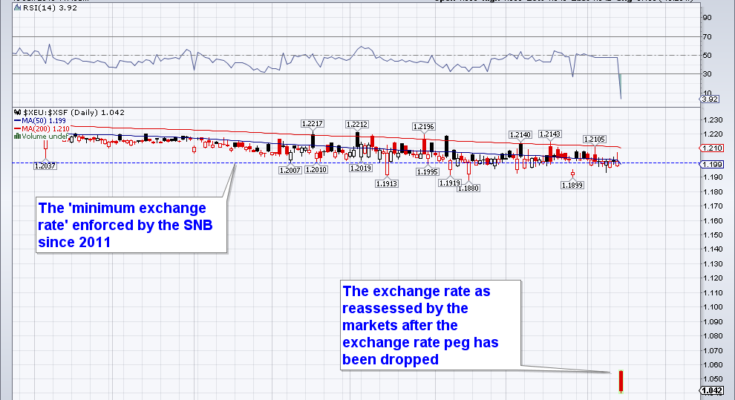Communication Breakdown
This morning the Swiss National Bank did what central banks supposedly don’t do anymore nowadays: it surprised the socks off the markets. After still solemnly insisting in its most recent monetary policy assessment that it would “defend the minimum exchange rate of the Swiss franc against the euro with the utmost determinationâ€, the SNB’s planners finally got cold feet and decided to abandon the policy without warning overnight (not that a warning would have done any good).

The market swiftly reassesses the EUR/CHF exchange rate – click to enlarge.
In so doing, the SNB’s board members have not only violated modern-day central bank etiquette, but have presented us with a reminder of how wonderfully stable today’s fiat currencies are. Bloomberg adopts a miffed tone of voice in its report on the matter:
“The Swiss National Bank unexpectedly scrapped its three-year policy of capping the Swiss franc against the euro in a U-turn that may change the perception of a century-old institution known for reliability.
In a surprise statement that sent shock waves through equities and currency markets, the central bank ended its cap of 1.20 franc per euro and reduced the interest rate on sight deposits, deepening a cut announced less than a month ago.
The shift marks an attempt by the SNB to reinforce its defenses of the economy before government bond purchases by the European Central Bank that could crumple the franc cap. The currency surged after the announcement, Swiss stocks including UBS AG tumbled and the chief executive of watchmaker Swatch Group AG said the policy shift would hurt exports. SNB President Thomas Jordan defended the move, saying surprise was necessary.
“It’s amazing that such a stoic central bank could end up abandoning such a long held policy with such short shrift,†said George Buckley, an economist at Deutsche Bank AG in London. “I thought we were out of the situation where central banks surprise so significantly as this.â€
With reverberations hitting everyone from currency traders in London to mortgage holders in Poland, economists responded to the SNB announcement with comments including “surprise†and “seismic.†Coming from a nation that has attracted investors for its stability, the change captures the scale of the battle policy makers have repeatedly faced going back decades to rein in a currency popular with investors at times of crisis.â€

FX trader Margo Spreadbottom upon hearing the news
Youtube screenshot
These unreliable rascals! When the SNB originally announced its interventionist policy, no such indignation was in evidence at Bloomberg or elsewhere in the mainstream financial press. CHF holders sure got creamed at the time though, as the franc quickly collapsed after the announcement.
We conclude that any policy that results in money printing on a gargantuan scale and shuts down an avenue for investors trying to protect their savings gets the nod from our bien pensants in the financial media, regardless of whether the markets are “surprised†by it or not. On the other hand, ending the inflationary policy in the same manner appears to meet with opprobrium.

